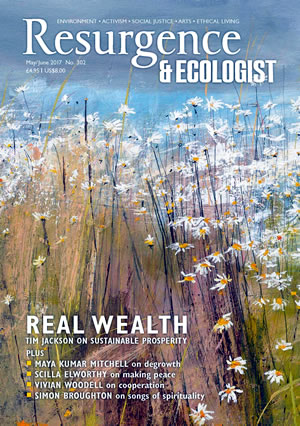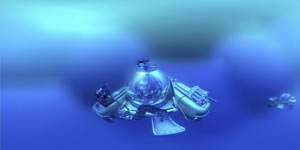Arthur C. Clarke once said that our Earth was ill-named and should rather be called Ocean. Our world is 71% sea, and our connection with it feels intrinsic to us as human beings. I feel more relaxed by the sea, most of us have dreamt of breathing underwater, and I remember my son tapping his foot in time with the waves when he was a baby. Our connection with the sea feels like part of our relationship with Nature, something most of us who are committed to our environment are trying to keep hold of and to engender in our young.
For most of my career as an arts curator, I’ve been engaged by environmental themes. In 2008, I worked with Nick Crowe on The Drowning of Tuvalu for the Whitstable Bienniale, a “tidal performance” of sculpture on the shore that commented on the rising sea levels caused by global warming. The following year, I set up Invisible Dust, a not-for-profit arts and environment organisation based in Scarborough, North Yorkshire that works with artists and scientists to explore environmental themes and issues, notably climate change.
The roots of our new exhibition, Offshore: artists explore the sea, were inspired by Alex Rogers, Professor of Conservation at the University of Oxford, whom I first met in 2011. Rogers is a marine biologist who, alongside campaigning for the oceans (setting up IPSO, the International Programme on the State of the Ocean), undertakes scientific trips to the deep ocean to find out about new species and examine the ecology of these vast, cold, dark underwater spaces.
Rogers says the oceans are like the circulatory system of our planet: their healthy functioning is critical to life, and without them millions of people would starve. Conversations with him about the huge threats to the health of our oceans from pollution, plastic, climate change and over-fishing led me to develop new ideas and exhibitions.
I set up Invisible Dust’s first artist–scientist collaboration, with artist Mariele Neudecker, in 2011. Rogers gave Neudecker video footage taken by the submersibles that he uses to film thousands of metres below the surface, which she adapted and edited to produce For Now We See, a series of atmospheric videos that highlight human impacts on the oceans, such as the awful ‘ghost’ nets discarded by industrial fishing ships at sea, which for years afterwards continue to trap and kill fish and other marine life.
Rogers and Neudecker have continued to collaborate and have inspired our current exhibition, Offshore: artists explore the sea, part of this year’s UK City of Culture. Hull’s history as a great British port made it the perfect setting. After the city won the award, I approached the Ferens Art Gallery and Hull Maritime Museum and asked them if they would host an exhibition together. From the start they were both keen that, as well as new work, we should draw on their wonderful collections of art and historical maritime objects.
As an example, Hull Maritime Museum has the largest collection in Europe of scrimshaw, engravings on whale bones dating from the 18th century. Works contributed by Ferens, meanwhile, include Dorothy Cross’s video Ghost Ship.
The project curators, Gemma Lloyd and Lara Goodband, have been working closely with the artists involved in the exhibition, and we have gained support from the Wellcome Trust, Arts Council England, and Hull Culture and Leisure. Offshore includes Tacita Dean’s celebrated chalkboard drawings ‘The Roaring Forties: Seven Boards in Seven Days’, where she uses the sea as a metaphor for storytelling. I first saw this captivating work in her 1998 Turner Prize show. We have it on loan from the Tate, and the boards will stretch across the entire side of the gallery.
The sea has been a place of terror as well as solace, of course, and in putting together the exhibition I wanted to connect to the millions of people who have journeyed across seas in search of a new life. John Akomfrah is an amazing film-maker who has won this year’s prestigious Artes Mundi prize; his work intertwines ideas around English history and racism and is often very theatrical. After seeing Vertigo Sea, an enormous atmospheric video projection about whaling, at the Venice Biennale in 2015, I was keen to include a work from him. I was delighted when he agreed for us to screen Mnemosyne, which explores the historical relationship between the sea and migration.
Another work that has a very personal connection for me is a new essay by author China Miéville. A couple of years ago my son was reading Miéville’s young adult fantasy novel Un Lun Dun and told me it was about air pollution, a subject about which I have produced several artists’ projects. I was soon reading The Scar and Kraken – I was hooked on the fast-moving and complex narratives, made-up words and far-fetched futuristic characters. I also recognised a shared passion about the deep sea. So I contacted Miéville. He asked whether I could arrange for him to journey into the deep sea in a submarine, just like his hero William Beebe, an extraordinary 1930s American writer and ecologist who set several successive records for the deepest dive.
As it happened, Alex Rogers was organising a dive trip with the ocean conservation organisation Nekton in Bermuda, where Beebe had been based. So last August Miéville retraced Beebe’s dive into Bermuda’s deep ocean. To dive in a bathysphere had been his dream since childhood. From this experience he has written a new essay, Tehom. Excerpts of his recorded voice will be available at Offshore on headphones, together with a specially designed hard copy of the essay.
I believe it is important to give audiences an opportunity to open up exhibition ideas through symposia. Sounding the Sea, organised with curator Steven Bode, will include Miéville’s first public reading of his essay, as well as a talk by the writer Philip Hoare. Alex Rogers will speak with exhibition artists Saskia Olde Wolbers and Mariele Neudecker and the poet John Wedgwood Clarke. Together with other scientists, artists, poets and historians, they will expand our cultural, historical and scientific notions of the sea – a relationship as important now as when our earliest ancestors emerged from the waters.
Offshore: artists explore the sea runs from 1 April to 28 August 2017 at Ferens Art Gallery and Hull Maritime Museum. The Sounding the Sea symposium will take place on 15–16 June at Hull University and Ferens Art Gallery. For more details visit www.invisibledust.com and for Alex Rogers’ IPSO initiative see www.stateoftheocean.org and seamountsexpedition.blogspot.co.uk
Join the conversation: #Offshore17








